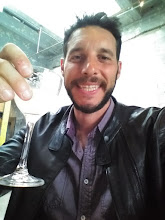How long it’s been, exactly, is indeterminable. The driver puts a hand to the hanging orb of sun as it barely clears a ridge of pines in the distance. It’s impossible to tell time the way the Indians do, with a sun that refuses to rise above the ten o’clock point before sinking back down.
“Damn winner.” The light comes in so slanted, it could be four pm all day. Every shadow races to the northern horizon; not in the shape of pine trees or frozen wheat stumps but merely in never-ending streaks, as if the Earth has been painted with stripes of night.
If the driver had to estimate (which he does, since he doesn’t wear a watch) how long he’s been standing there next to his broken down pickup, he would say an hour. It’s been twenty six minutes. Apparently, as the days grow shorter, time stretches out.
A tow truck grows out of the distance. It passes the driver and his jalopy, and shows no sign of slowing down until its break lights liven to a hopeful red. It’s backing up, slowly. The driver’s guess is that it was not sent out on a call, at least not for him, but just happened to be passing by. His suspicions are confirmed when a potbellied man jumps out of the cab and approaches the car. He tilts his bald head and furrows his brow as if he doesn’t know what to make of the sight in front of him. The driver wants to tell him that if he can’t recognize a car when he sees one, then he’s gone into the wrong profession. The man jumps to life once he realizes how long he’s been standing there with a skeptical wince and how confused he actually looks.
“Wha’happened?”
“It’s th’rady-ator. Pletely blew out on me.”
The man takes a look anyway. He takes even longer to inspect the charred insides under the hood. It’s not a mathematical theorem, it’s a radiator cap that wasn’t screwed on tight enough. The driver suddenly feels the bite of impatience. He’s surprised by how similar it tastes to rage.
“Ar righty.” He groans up from the hood as if he’s just finished taking a leak. “Tell you h’wat. I’m heddin downta I-wa Cid-ee on a call. I kin tow ya ta a gur-age there, a great guy, I know im, an we kin call it an eve-in tweny.”
Twenty dollars for a tow is robbery. The garage will probably charge even more than that for repairs, if this tow truck man is as chummy with its owner as he makes out. The only saving grace is that it’s an hour’s ride in the right direction. The driver swallows his objections and follows the man to his truck. More grating than the outrageous price –Americans’ entrepreneurial talents really shine in times of other people’s crisis- is the driver’s relegation, however brief, to the role of hitchhiker.
“Goddamned radiator!”
He’s convinced that the view from the passenger side isn’t half as good. At least this driver seems happy to carry his fare with hardly any questions. Just a couple of preliminary grunts and they’re off. The sun shines directly through the passenger window, blinding in its wintry weakness.

